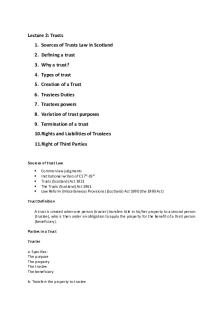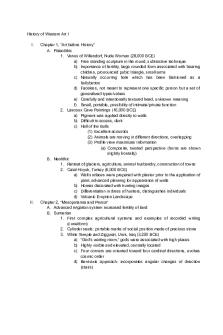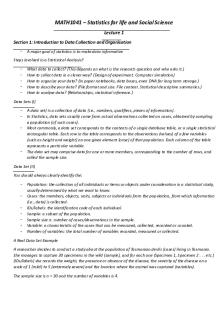LEGL1001 Notes PDF

| Title | LEGL1001 Notes |
|---|---|
| Course | Foundations of Law |
| Institution | University of Newcastle (Australia) |
| Pages | 3 |
| File Size | 87.1 KB |
| File Type | |
| Total Downloads | 52 |
| Total Views | 133 |
Summary
Notes...
Description
LEGL1001 Notes Key Cases Pharmaceutical Society of Great Britain v Boots This case involved consideration of the point in time at which an 'offer' and 'acceptance' is made in department stores where goods are made available on shelves for customers to take to the cashier and purchase. The Court in this case determined that placement of goods on shelves constituted an 'invitation to treat’, with an offer being made (and capable of being rejected) when the customer took the items to the cashier for purchase. Ermogenous v Greek Orthodox Community of SA Inc Archbishop Ermogenous made a claim for payments he thought due for annual and long service leave from the Greek Orthodox Community. He succeeded at first instance but the Full Court of the Supreme Court of SA found there was no intention to create legal relations between the parties. An appeal was made to the High Court. The court decided that the agreement between the parties that the contract was executed with the intentions for it to be legally binding. Dunlop Pneumatic Tyre Co Ltd v Selfridge and Co Ltd The plaintiff (Dunlop) sought to establish and enforce a resale price maintenance (RPM) scheme. The plaintiff sold tyres to Dew & Co (a tyre dealer) which then sold to Selfridge on condition that Selfridge would not sell below the list price. Selfridge failed to comply with the condition; the plaintiff sued for breach of contract. Court held Dunlop was not entitled to enforce the contract against Selfridge because it was not a party to the contract. Donoghue v Stevenson The ruling in this case established the civil law tort of negligence and obliged businesses to observe a duty of care towards their customers. The events of the case took place in Paisley, Scotland in 1928. While attending a store, Ms May Donoghue was given a bottle of ginger beer, purchased for her by a friend. The bottle was later discovered to contain a decomposing snail. Since the bottle was not made of clear glass, Donoghue consumed most of its contents before she became aware of the snail. She later fell ill and a physician diagnosed her with gastroenteritis. Donoghue subsequently took legal action against Mr David Stevenson, the manufacturer of the ginger beer. She lodged a writ in the Court of Sessions, Scotland’s highest civil court, seeking £500 damages. Shaddock & Associates Pty Ltd v Parramatta City Council (1981) In Shaddock & Associates Pty Ltd v Parramatta City Council (1981) 36 ALR 285, the High Court held a local government liable for negligently failing to check what roads were going to be widened before advising a property developer that a road would not be widened adjacent to the land he was buying. That advice was not correct and, after the sale, 1/3 of the property was compulsorily bought by the government, making redevelopment of ther remainder impossible, resulting in loss of profit by the developer. The court held that a duty of care in relation to advice is foreseeable if the advice is given in a professional context; the speaker ought to have realised, that his or her advice would be acted on; and it was reasonable for the recipient to act on the advice.
Stevens vs Brodribb Sawmilling This case established the test for determining whether workers are in an employment relationship or if the worker is engaged as an independent contractor. The case is therefore authority for the test which assists to determine whether a worker is an employee or a contractor. The court considers the ‘totality of the relationship, within which, control is an important aspect’. The High Court held that on the facts, neither Stevens nor the snigger were employees of Brodribb Sawmilling Company Pty Ltd. The company was not vicariously liable nor personally liable for the breach of the duty of care. On the evidence, the logging season lasted six months; both workers provided their own equipment, set their own hours of work and received fortnightly payment which was not fixed as it was determined by the amount of timber they delivered. Further, Brodribb Sawmilling Company Pty Ltd did not deduct income tax. Stevens made himself available daily but the company did not guarantee him work. Stevens was also free to seek other work in bad weather or in other circumstances. IRAC Rules Consumer Law “A person must not, in trade or commerce, engage in conduct that is misleading or deceptive or is likely to mislead or deceive”, Section 18 ACL A ‘consumer contract’ is a contract for the supply of goods, services or an interest in land where the acquisition is wholly or predominantly for personal, domestic or household use or consumption, Section 23(3) ACL Any person who suffers loss (including a competitor) because a business has engaged in misleading and deceptive conduct can commence proceedings and seek a remedy under section 18, Eveready Australia Pty Ltd v Gillette Australia Pty Ltd [2000] ATPR 41-51 The intention of the business who has engaged in the conduct is irrelevant, Henjo Investments Pty Ltd v Marrickville Pty Ltd [1989] 89 ALR 539 In assessing the conduct the standard is lower than the ‘reasonable person’ standard, it is the standard of the ‘unsuspecting modest member of the community’, Taco Company of Australia Inc v Taco Bell Pty Ltd 91982) 42 ALR 177 “Engaging in conduct” includes making a statement claim or promise - Gillette Australia Ltd v Energiser Australia Pty Ltd (2002) “Trade or commerce” means trade or commerce within Australia, or between Australia and places outside Australia. Section 2 ACL As a general rule, a person who is not a party to the contract (a third party) cannot sue or be sued for breach of the contract. This is known as the doctrine of privity of contract, Trident General Insurance Co Ltd v McNiece Bros Pty Ltd (1988) 165 CLR 107 A condition is a term of the contract of fundamental importance. In the absence of such a term, the party favoured by the term would not have entered into the contract in the first place. If one party breaches a term that is a condition, the other party has the right to: (i) confirm the contract and recover damages, or (ii) terminate the contract and recover damages. Associated Newspapers Ltd v Bancks (1951) 83 CLR 322
Employer vs Contractor The traditional test of determining if someone is in an employment relationship is the control test – where the employer has power not only to direct what work is to be done, but the manner in which it is done. FCT v J Walter Thompson (Aust) Ltd (1944) 69 CLR 227 A business organisation will be a partnership if all of the following requirements are satisfied. - There are two or more persons involved. - Those persons are carrying on a business. - They are carrying on the business in common. - They are carrying on the business with a view of profit. Section 1 Partnership Act 1892 (NSW) In Australia the High Court has held that while a degree of control is an important factor, it is not the only factor. The test that applies is the “ multi indicia” test. Stevens and Gray v Brodribb Sawmilling Co Pty Ltd (1986) 160 CLR 16 An agent will have apparent authority to act on behalf of the principal if all of the following requirements are satisfied. - The third party did not know that the agent did not have actual authority. - The principal ‘ held out’ the agent as having authority to act on the principal’s behalf — for example, by appointing the agent to a particular position, or by having held the agent out as having authority in the past. - The third party relied upon that holding out, and reasonably assumed that the agent had actual authority. Panorama Developments (Guildford) Ltd v Fidelis Furnishing Fabrics Ltd [1971] 2 QB 711 The court has to look at a number of indicia and then make up its mind into which category the instant case should be put. It is a question of balancing the indicia pro and con’ Bray CJ in Australian Mutual Provident Society v Chaplin (1978) Other factors that may be relevant include: Is the contract for a certain or specified task? Is payment periodic or lump sum? Are hours of work fixed? Who supplies the tools? Can the person delegate work? Is PAYG tax deducted? Are benefits such as sick leave, holiday pay or long service leave given? The Court may take into account the economic reality of the situation and consider whether the worker was really engaged in an independent enterprise, factors may include whether pay rates are negotiated or set by the hirer and the wearing of a uniform, Hollis v Vabu Pty Ltd (2001) 207 CLR 21 Employees must obey their employer’s commands if they are reasonable, lawful, appropriate and within the scope of the terms of employment, Australian Telecommunications Commission v Hart (1982) 65 FLR 41...
Similar Free PDFs
Popular Institutions
- Tinajero National High School - Annex
- Politeknik Caltex Riau
- Yokohama City University
- SGT University
- University of Al-Qadisiyah
- Divine Word College of Vigan
- Techniek College Rotterdam
- Universidade de Santiago
- Universiti Teknologi MARA Cawangan Johor Kampus Pasir Gudang
- Poltekkes Kemenkes Yogyakarta
- Baguio City National High School
- Colegio san marcos
- preparatoria uno
- Centro de Bachillerato Tecnológico Industrial y de Servicios No. 107
- Dalian Maritime University
- Quang Trung Secondary School
- Colegio Tecnológico en Informática
- Corporación Regional de Educación Superior
- Grupo CEDVA
- Dar Al Uloom University
- Centro de Estudios Preuniversitarios de la Universidad Nacional de Ingeniería
- 上智大学
- Aakash International School, Nuna Majara
- San Felipe Neri Catholic School
- Kang Chiao International School - New Taipei City
- Misamis Occidental National High School
- Institución Educativa Escuela Normal Juan Ladrilleros
- Kolehiyo ng Pantukan
- Batanes State College
- Instituto Continental
- Sekolah Menengah Kejuruan Kesehatan Kaltara (Tarakan)
- Colegio de La Inmaculada Concepcion - Cebu















